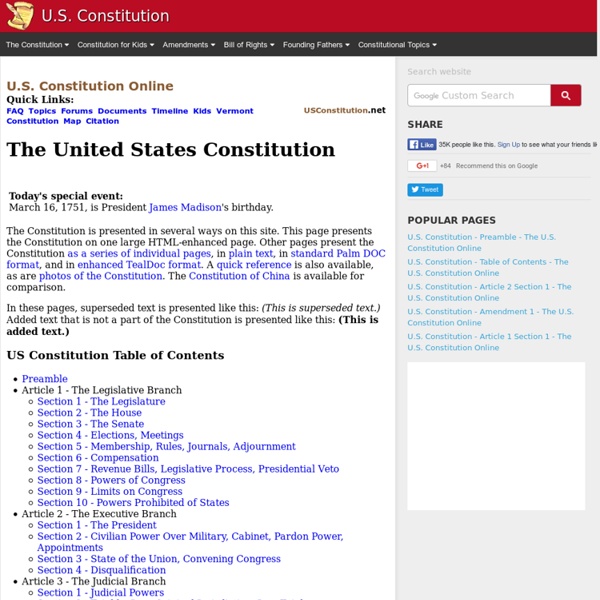The United States Constitution

Magna Carta
Magna Carta was the first document forced onto a King of England by a group of his subjects, the feudal barons, in an attempt to limit his powers by law and protect their rights. The charter is widely known throughout the English speaking world as an important part of the protracted historical process that led to the rule of constitutional law in England and beyond. The 1215 charter required King John to proclaim certain liberties and accept that his will was not arbitrary—for example by explicitly accepting that no "freeman" (in the sense of non-serf) could be punished except through the law of the land, a right that still exists. The name Runnymede may be derived from the Anglo-Saxon 'runieg' (regular meeting) and 'mede' (mead or meadow), describing a place in the meadows used to hold regular meetings. The Witan, Witenagemot or Council of the Anglo-Saxon kings of the 7th to 11th centuries was held from time to time at Runnymede during the reign of Alfred the Great. Clause 61[edit]
Declaration of Human Sovereignty - Regarding Contact with Extraterrestrial Forces and Nations
Read the Charter
Preamble We stand at a critical moment in Earth's history, a time when humanity must choose its future. As the world becomes increasingly interdependent and fragile, the future at once holds great peril and great promise. To move forward we must recognize that in the midst of a magnificent diversity of cultures and life forms we are one human family and one Earth community with a common destiny. We must join together to bring forth a sustainable global society founded on respect for nature, universal human rights, economic justice, and a culture of peace. Towards this end, it is imperative that we, the peoples of Earth, declare our responsibility to one another, to the greater community of life, and to future generations. Earth, Our Home Humanity is part of a vast evolving universe. The Global Situation The dominant patterns of production and consumption are causing environmental devastation, the depletion of resources, and a massive extinction of species. The Challenges Ahead Top Principles
Artificial-Natural Page
Natural vs. Artificial: There are two "persons" identified in law. These are "natural-person" and "artificial-person". See Government Tricks for more details. A natural-person is defined as "A human being that has the capacity for rights and duties". An artificial-person is defined as "A legal entity, not a human being, recognized as a person in law to whom legal rights and duties may attach - e.g. a body corporate". There are many different types of artificial-persons, each with different duties. Taxpayer, Resident, Driver, Voter, Citizen, Homeowner, Officer. Whenever you read any Law or Statute, you must be sure to check the meaning of the word "person" as it applies to that particular law. In order to implement slavery of it's citizens and control them according to its whim, the Government had to invent a system that would not violate a human-being's fundamental rights, but would allow the Government to "own" everything produced or gained by its citizens. Response to a Reader: Begin Quote
Related:
Related:



